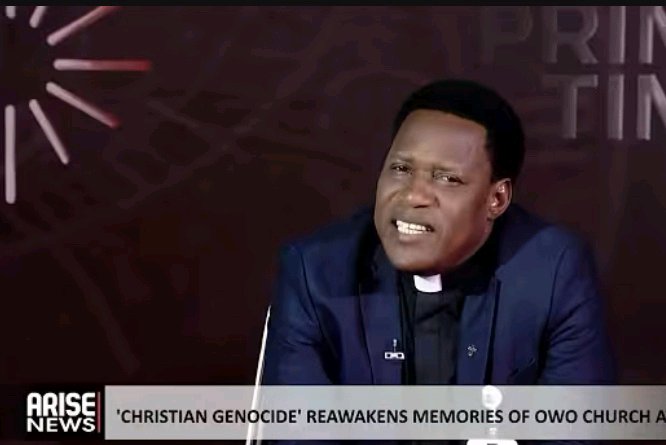Father Atta Barkindo, Director of the Policy Research Institute at the Kukah Centre, has cautioned against hasty acceptance of U.S. military involvement in Nigeria, warning that such an intervention could “get very messy.” Speaking in an interview on Arise Television on Tuesday, November 4, 2025 from 15:37, Barkindo was asked whether he would welcome American troops in Nigeria following comments by the U.S. President Donald Trump about possible military action in the country.
He replied: “I’m not a military person. I don’t know how. My younger brother was in the army. He was killed in Baga. And I think for me, welcoming the troops, does it mean really fighting or does it mean helping with building the capacity of our own soldiers and helping us with weapons? I think I would prefer the latter. That they come, they support us, they build capacity, they provide intelligence. Because otherwise, the reaction, I don’t know how the reaction will end. Because you can see that China has already reacted. We are not going to, we are going to stand with Nigeria. We don’t know what the Middle East, how they will react. And we even don’t know how the jihadists themselves will react.”
He expressed concern that the presence of American troops could trigger unpredictable regional and global reactions, citing examples from the Middle East and Africa. “You also hear the stories that they have surrounded Bamako. And they are likely going to take Mali and maybe the whole of Sahel. And the contestation between Al-Qaeda and ISIS, you know. With Boko Haram and the Jamaat Nasirul Islam wal Muslim. So we don’t want to get caught up. It could get very messy. Messy. They were in Afghanistan, they were in Iraq. Look at the result of eventually what has happened,” he stated.
Barkindo suggested that rather than direct military intervention, the U.S. and Nigeria should focus on collaboration through training, intelligence sharing, and equipment support. “I think it has to be an engagement and a very strategic negotiation. Between the Nigerian government and the American government. And they should reach an area where there is some sort of an agreement,” he added.
He further emphasized that not all forms of violence in Nigeria are physical, drawing attention to systemic inequalities that persist across regions. “But I don’t want us also to dwell too much on the physical violence. There are non-physical issues, unwritten laws that people really actually go through. So for example, the taking off of missionary schools. Can they return these schools? The refusal to help us build places of worship for certain faiths in federal institutions, for example. So I think for me, these are all issues to be discussed. There are certain places in northern Nigeria, if you are not a Muslim, you cannot become a traditional ruler. These issues must be addressed, in my opinion. And these are not physical violence. These are unwritten laws that are not part of the constitution.” View, More,
Explore More News By Using The Button.

